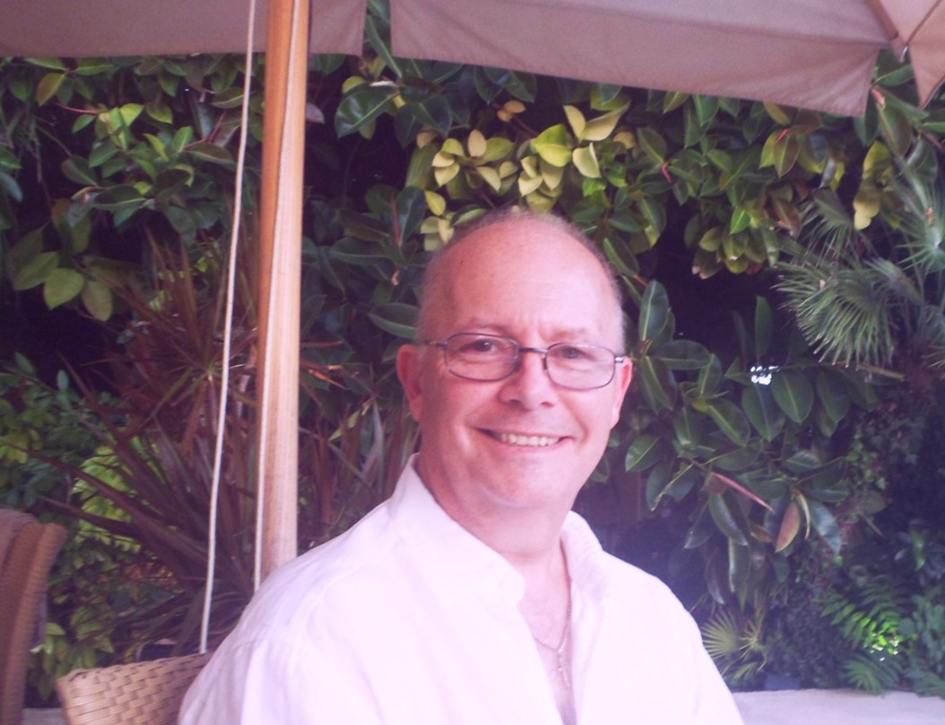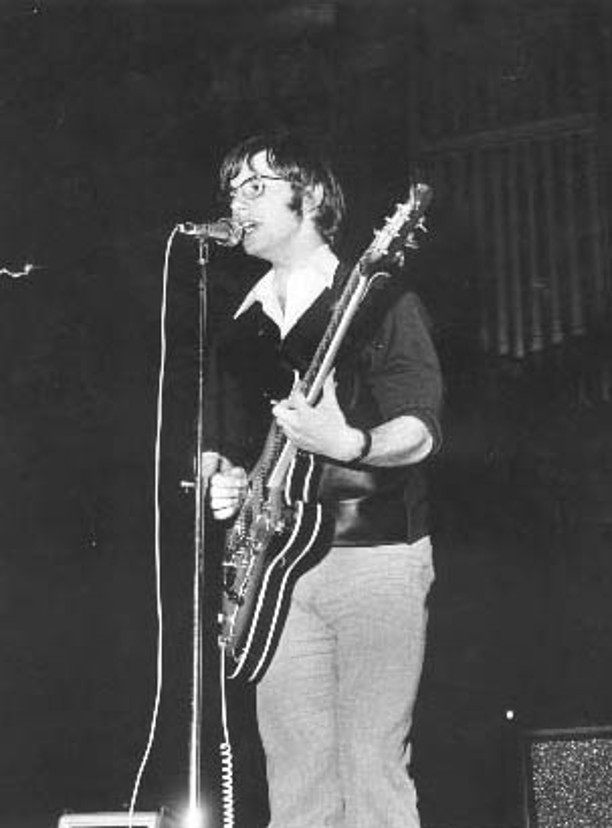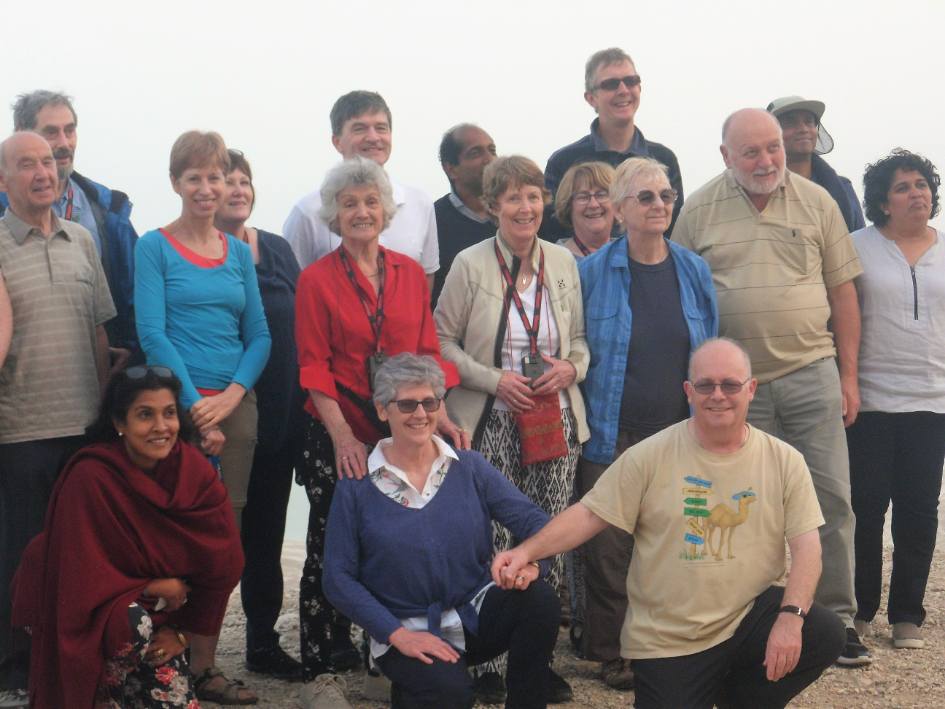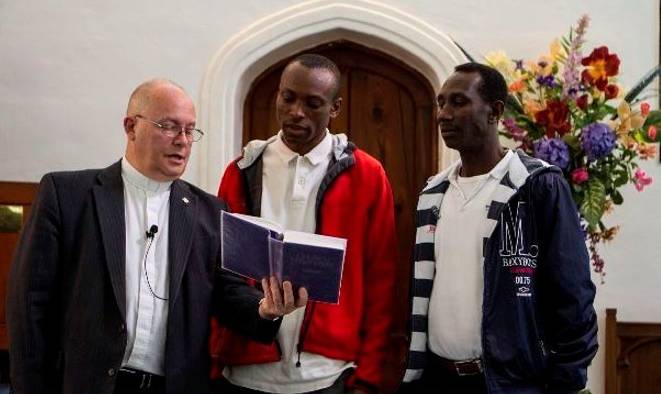May 2025: Rev Doug McRoberts
The Church of Scotland's Talking Ministry monthly series shares personal stories from those serving in Christian ministry, along with resources filled with questions, prayers and reflections to help encourage reflection on how God might be calling you at this time
For May, Rev Doug McRoberts, who celebrates the 50th anniversary of his ordination next month, looks back on combining ministry with a top communications career before a return to parish ministry in Scotland and Malta. Now retired, he and his wife Lesley live in Inverness where he is the first Presbytery Moderator of Clèir Eilean Ì, the Church of Scotland in the Highlands and Hebrides.
My ministry: Rev Doug McRoberts
What led you to ministry?

For me, it was a growing awareness in my early teens. I attended Scripture Union camps and holiday missions and became a leader as a student. I remember at Hutchesons' Grammar School having a speaker from the Missionary Aviation Fellowship and he really got my attention because the idea of somehow serving Christ and flying seemed really good to me.
I started an MA at Glasgow University, but two years later transferred to Divinity because I was really feeling a call by then.
At the same time, I'd always been interested in electronics, which led me into student broadcasting, I played sport and I was also a musician.
One thing that emerged from that was the rock band White Light.
Was this also an element of your ministry?
Very much so. We took our music seriously. We practised hard and played across Scotland and into England. The ethos was very much about going out to where the kids were.
In 1972 we entered a competition organised by Melody Maker and we reached the final and played some big venues, including Aberdeen Music Hall in the same weekend as Deep Purple, and outsold them!
That was a highlight for us, as was 1974, when we recorded an LP, Parable.
Decades later it appeared in a list of the world's rarest records. I looked it up online and people were offering silly money for copies.
Then a Spanish record company called me up out of the blue and asked if they could reissue it. The Church's media team did a story which was picked up by the BBC and national press.
The reason for the record in the first place was to get the Word of God out there and, in 2016, the word was out there again.

Why did you decide to leave full-time ministry to join the BBC?
That drew together things I had been doing since I was at university where I was involved in student radio, and I am forever indebted to Professor of Practical Theology Murdo Ewen Macdonald, who spotted that I had more than a passing interest in broadcasting and electronic communications and suggested I spend six months attached to STV for my Certificate of Pastoral Studies.
I learned a lot in that year and in 1978, when the BBC was expanding in Scotland and I was working as a parish minister in Kirkcaldy, I saw an opportunity and they took me.
I joined the BBC in Inverness and fairly shortly into my stay, I was producing and presenting morning news programmes and lunchtime magazine programmes. Interestingly, the area we covered was almost identical to Clèir Eilean Ì.
From then until 2002, I was professionally involved in communications but still with a commitment to ministry, and wherever I was in Scotland, I made myself available to preach in the local presbytery.
How were you able to continue to combine preaching and your communications career?
That went back to a group of us at Glasgow University who had this idea of recreating New Testament ministry. Paul sustained himself as a preacher by making tents and Peter almost certainly did the same as a fisherman. The idea was that you would do your work, but still be recognised as the minister and teacher and I managed to do that all through my communications career.
As a professional broadcaster, I learnt from senior editors about how to shape words and use communications opportunities. If that didn't inform my ministry, then I was missing out somewhere.
I was at the BBC from 1978 to 1985, and then moved to Caithness as an Atomic Energy Authority (AEA) media officer at Dounreay, which meant my ministry took a different turn because Caithness Presbytery opened up as well.
Then the post of chief press officer with AEA came up and I was told to apply for it and in 1989 we moved to Oxfordshire.
One of our press officers was also a lay reader in the Methodist Church and he obviously told his superintending minister that I was coming to the area. Even before I started working in London, he had asked me to join the local preaching circuit, so I was soon preaching almost every Sunday while also working as the UK AEA's chief press officer in London.
I was seriously impressed with how the Methodist Church had checked out my background. I was even more impressed a few months later when there was a big reshuffle of the civil nuclear industry and I moved to Gloucester to become the media relations manager of a new company, Nuclear Electric.
Literally within 24 hours, the circuit superintendent of Gloucester was on my doorstep asking if I would join them.
Then in 1995, the Government decided it would privatise the UK's nuclear power stations and that the new company leading this would be based in Scotland. I was asked to become the first PR director of British Energy PLC. As soon as they said "in Scotland", I said yes. I didn't even ask where.
That gave me a whole new set of skills because now I was at director level of a FTSE 100 company which would eventually operate in the USA, Europe and Canada.
But it also brought me back to Scotland and another new preaching field after we moved to Dalgety Bay and I preached in every church in the Presbytery of Dunfermline, except Dunfermline Abbey.
In the communications sector, I was now a recognised international operator. I became the only non-French chairman of NUCNET, which is an international non-profit news organisation feeding AP, Reuters, the BBC, CNN etc. And yet, at weekends, I was still exercising a Scottish preaching ministry in the Presbytery of Dunfermline.
I started to think about going back to full-time ministry and eventually applied for a church in Edinburgh, but while the vacancy committee was still deliberating about which applicant to accept, an advert for Keith North caught my attention.
The advert appeared in midsummer and the parish profile showed a picture of the manse covered in snow, which was very honest of them, but it also made it clear that this was an innovative congregation.
The church owned a shop on the High Street, there was a church secretary and an opportunity for an assistant minister and a youth worker as a result of an endowment. They were looking for a minister to bring all of this together so we went to Keith, where we experienced vast quantities of snow, but also a very willing and vibrant congregation.
We decided that it would be wise to have a stewardship campaign, which we called Building Church after a similar campaign Susan Brown had started at Dornoch Cathedral, but we didn't want it to just be about money. The emphasis was on involvement and one thing that worked for us was encouraging people to use their talents. If you bake, bake cakes and sell them, so you are literally using your talents for the church.

What prompted your next move?
About five years into my time at Keith, Lesley was looking at a copy of Life & Work, which coincidentally had advertisements for charges in Bermuda and Malta.
It was Malta that caught my attention, and I discovered it had a very international congregation and was the only joint Church of Scotland and Methodist charge with ministers from each denomination taking it in turn to lead the congregation.
What was I? A Church of Scotland minister who had worked in Methodist circuits in England and understood that system fully. All these threads from my life up to that point – operating in international communications, preaching every Sunday, seeking to teach people my understanding of God's word – started to draw together.
This was the strongest sense of call I had ever had. The best way I can express it is not so much that I felt that I needed to apply for this, but that I needed to offer myself for it.
I applied and very quickly became the sole nominee, but when I went to Malta, the treasurer told me that I would be the last minister there because the church, which had mainly been a forces chapel, was winding down.
But six weeks before we came to Malta, I had a call from a friend, Peter Lloyd, who was to become very important to the congregation. He had retired from his financial career, but was feeling a call to mission and he and his wife Elizabeth had opted to move to Malta, where he had lived as a child, while they decided where this might take them.
Peter asked if there was anything he could do to help. The one thing he said to me was he was not going to become treasurer, but of course he did.
Peter looked at the books with a professional eye and decided there was a different story here. There were reserves that could keep the church going for a year or two and there was an income stream, which wasn't adequate, but his view was: "Money has been given to be used, not to be stored." His whole philosophy was just so positive.
How did things change in Malta?
One of the first things we did was start a Building Church campaign similar to one we had done in Keith and use all the skills and contacts of this international church to start doing things for Christ.
One idea was to take the parable of the talents literally. We handed out 10 Euros each and encouraged people to use them for the good of the church. We wanted to give out 1,000 Euros, but had just over 700. The next morning, I went to the church and the first letter I picked up was from a couple from Mallaig, who had come to the end of their stay in Malta and they'd dropped off 300 Euros they had spare and told us to use them. That brought us up to the 1,000 Euros we wanted.
October came and 4,500 Euros came back. Some people might be disappointed by that, but it got people thinking about regular giving and was the start of an amazing period.
Then in March 2011, the Arab Spring happened. Uprisings took place across North Africa and the Middle East and very rapidly Malta became the centre of a major refugee crisis.

Every boat brought to Malta contained either pregnant women or children or usually both, so they had to be rescued and we found ourselves involved in lots of different ways. We had a prayer ministry at a tented city in a former RAF air base. Conditions were absolutely horrendous – imagine the worst and then double it – but we were there every week, exercising ministry and trying our best to help people.
I'm getting caught in the middle of this as a minister, but I'm also a communications professional – the right guy in the right place at the right time to tell this story to the world.
Life and Work ran a web story on what was happening on Malta and it was seen by a Times of Malta reporter who rang me to ask what I thought of the situation. The story ran on the bottom half of the front page, while the top was about the Prime Minister, Joseph Muscat, being determined to send refugees back into harm's way. You couldn't get a more blatant contrast, but by the Friday of that week the Archbishop of Malta put out a statement welcoming the refugees and the following day the President of Malta said the same thing and everything changed.
The refugee project, meanwhile, had taken off by leaps and bounds. We called it Out of Africa… …Into Malta. It became a Guild partner project and I found myself giving briefings to the Guild in Scotland to help the project to go.
I was able to put out prayer letters and stories around the world because of contacts from my previous career. One of the first results was an anonymous donor in the Netherlands sent 10,000 Euros and thanks to him, every refugee in Malta had a quilt that winter.
It was like Building Church on a grand scale and saving lives, but it is not just the saving of life, it is the turning of life. There were people involved in our church giving thanks to people in Scotland and beyond whose names they would never know, who had caused them to be there and be safe.
We were able to use a crypt which had been used as a store by a shopkeeper as a base for a microfinance organisation that was again Peter's idea and helped refugees start businesses or get training.
It was just part of the big miracle that became how Malta deals with refugees.
Lesley and I were back in Malta recently and visited St Andrew's Church to see if anything was still happening in that crypt. Not only was something happening, it was buzzing.
The church that the treasurer told me was going to close has gone from strength to strength and is still one of the most international congregations in the Church of Scotland. In mission terms it is punching well above its weight.
This is God at work and it was such a privilege to be there at that time and be able to help this all come together.
How did you become involved in Clèir Eilean Ì, a presbytery which covers 40 per cent of Scotland's landmass?
I retired in 2014, came to Inverness and became a member of Inverness Presbytery so I could carry on preaching in Inverness with occasional ventures elsewhere.

I became part of the transition team that brought Clèir Eilean Ì together and quite a lot of that followed from my experience elsewhere, not least seeing how the Methodists operate.
They have been dealing with a lot of the same problems we have for a long time. They have never had enough ministers, so they have always relied on lay readers and have seen the wisdom of having a professional resource available to help people locally. That is essentially what the new presbyteries are doing throughout Scotland.
I had the privilege of presenting the case for Clèir Eilean Ì to the General Assembly. For me, that was a real moment. To be able to stand in front of the General Assembly, representing such a wide area and say there has been a real coming together, I found that quite moving.
One of the final tasks of the transition team was to find a business convener and a moderator. Finding a business convener was remarkably easy. From five different places came the name of Donald McCorkindale, but no names were coming forward for the first moderator. It wasn't very long after that Donald said: "I think it's you!"
There has been a lot of trauma in getting to where we are now, but Clèir Eilean Ì is part of the resolution of that, not part of the problem. Wherever I go, I meet people with a heart for mission and a willingness to do things in a new way and I find that very encouraging.
Your two sons have followed into forms of ministry, Scott as minister of St Columba in Inverness and Struan as a former church youth worker, so do you have any advice for the next generation of ministers?
They are not sons of the manse. I was not in full-time ministry when they were young, but both the boys went through similar experiences to me with Scripture Union summer missions, and both ended up doing divinity degrees. Scott is in a different place from me theologically, but he is in a very similar place in his approach to life and ministry. He is trying new things all the time and more of them are working than not and it is a joy to see that.
Struan, meanwhile, has found ways of ministry that are not formal ministry and will do it now as a teacher having done it as a youth worker.
One of my old ministers, Ronnie Johnstone at Thurso West, used to say ministry is the best job in the world and I now understand that. It is a great adventure.
If I was talking to anybody now thinking about going into ministry, my advice would be to absolutely push the envelope.
Find ways of doing what you are most seriously called to do. Don't just do what the system is telling you to do. There are lots of different ways of Christian service.
Ministry looks nothing like it did 50 years ago and if I was to look at the future, 50 years from now, I think it will look as different from now as it does to me looking back to when I was ordained.
Fifty years ago, it was quite simple. You became an assistant minister, you became a minister, you moved to a parish. I don't think that's a recipe for the Church for the future.
If you look at the examples from the Acts of the Apostles, you see that they would stay in a place, they would do what had to be done, they would find a new place and then there would be someone else who would come in, able to sustain the changes they had been able to bring.
That would be my other piece of advice for new ministers: read your New Testament intelligently, particularly the Acts of the Apostles. Look at what is really going on there, because there are ministerial patterns which worked then and still work to this day.
They absolutely do not need to be a minister of Word and Sacrament in one place. For me, it has been a rare privilege and an opportunity to find myself in all sorts of interesting places.
More information
If you would like to consider how God might be calling you to serve at this time, you may want to discuss further with your minister or be in touch with your Presbytery to explore local opportunities.
If you are interested in exploring a call to the recognised ministries of the Church, you can find more information on our vocations page and can contact ministry@churchofscotland.org.uk for a Discernment Conversation with one of the Recruitment Team.